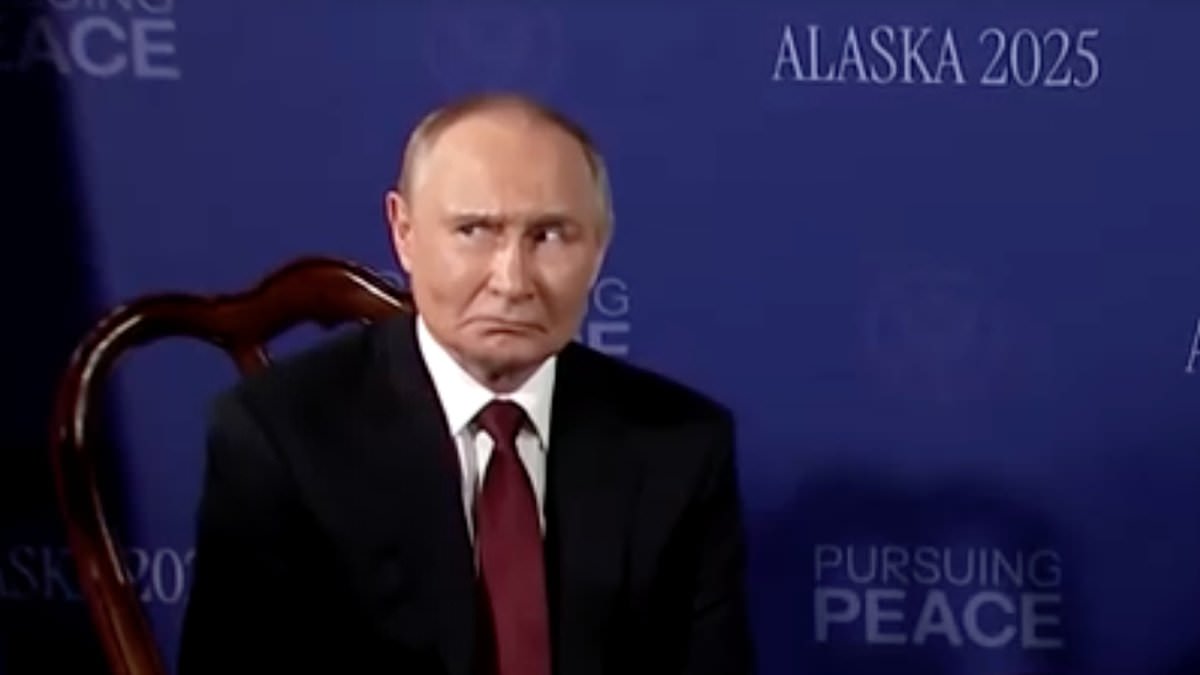
During a high-stakes summit in Alaska on Friday, Russian President Vladimir Putin found himself under intense scrutiny as U.S. journalists peppered him with questions about the ongoing conflict in Ukraine. The meeting, held alongside former U.S. President Donald Trump, unfolded with tension as reporters sought accountability from the Russian leader.
Putin’s Uneasy Encounter with the Press
Seated next to Donald Trump, Putin appeared visibly unsettled as reporters pressed him on various issues, including a potential ceasefire and the killing of Ukrainian civilians. One journalist boldly asked, “Mr. Putin, will you break the ceasefire?” while another questioned, “Will you commit to not killing any more civilians?” Putin, seemingly caught off guard, responded inaudibly and appeared confused as further questions probed his credibility.
The media was quickly ushered out of the room before Putin could provide substantial responses, leaving many questions unanswered. Trump, in contrast, thanked the press for their queries with a composed demeanor, a marked difference from Putin’s discomfort.
No Immediate Deal from Alaska Summit
Following the media encounter, Trump and Putin engaged in a two-and-a-half-hour summit to address the Ukraine conflict. Despite high expectations, the meeting concluded without a concrete resolution. Trump later remarked during a press conference, “There’s no deal until there’s a deal.” While he emphasized several points of agreement, he noted one significant issue remained unresolved.
Trump struck an optimistic tone, stating, “We didn’t get there, but we have a very good chance of getting there.” However, he refrained from sharing specific details on the discussions. Adding intrigue to the conclusion, Putin surprised Trump by suggesting a future meeting in Moscow, prompting a visibly taken-aback Trump to respond, “Oh, that’s an interesting one…”
Mixed Reactions to the Summit
While Russian envoy Kirill Dmitriev heralded the talks as having gone “incredibly well,” Ukrainian officials were less impressed. Ukrainian politician Oleksandr Merezhko labeled the summit a “failure,” criticizing Putin’s repetitive rhetoric and perceived lack of progress.
Ukrainian President Volodymyr Zelensky also weighed in, reaffirming that Ukraine’s constitution makes territorial concessions “impossible.” Speaking in Brussels ahead of a virtual meeting with European leaders, Zelensky stressed the need for direct negotiations with Russia, while reiterating that decisions about Ukraine’s borders must be made by Ukrainian leaders alone.
Trump Responds to Critics
On Sunday, Trump took to his social media platform, Truth Social, to defend the Alaska talks. “It’s incredible how the Fake News violently distorts the TRUTH when it comes to me,” he wrote. “I had a great meeting in Alaska on Biden’s stupid war, a war that should have never happened!”
In another post, Trump criticized the media for allegedly downplaying the summit’s achievements, asserting, “If I got Russia to give up Moscow as part of the deal, they’d still call it a terrible mistake.” He also claimed to have played a role in stopping six other conflicts.
European Leaders Rally Behind Ukraine
Meanwhile, European leaders, including German Chancellor Friedrich Merz, French President Emmanuel Macron, and NATO Secretary General Jens Stoltenberg, prepared to meet with Zelensky in Washington to support Ukraine’s efforts. British Prime Minister Sir Keir Starmer expressed his continued commitment to ending the war, stating that allied nations stand “ready to support this next phase of further talks.”
Despite differing interpretations of the summit’s outcomes, one point remains clear: the path to peace in Ukraine is far from certain. Diplomatic efforts will need to address the complex web of territorial, political, and security concerns to bring an end to the ongoing conflict.






